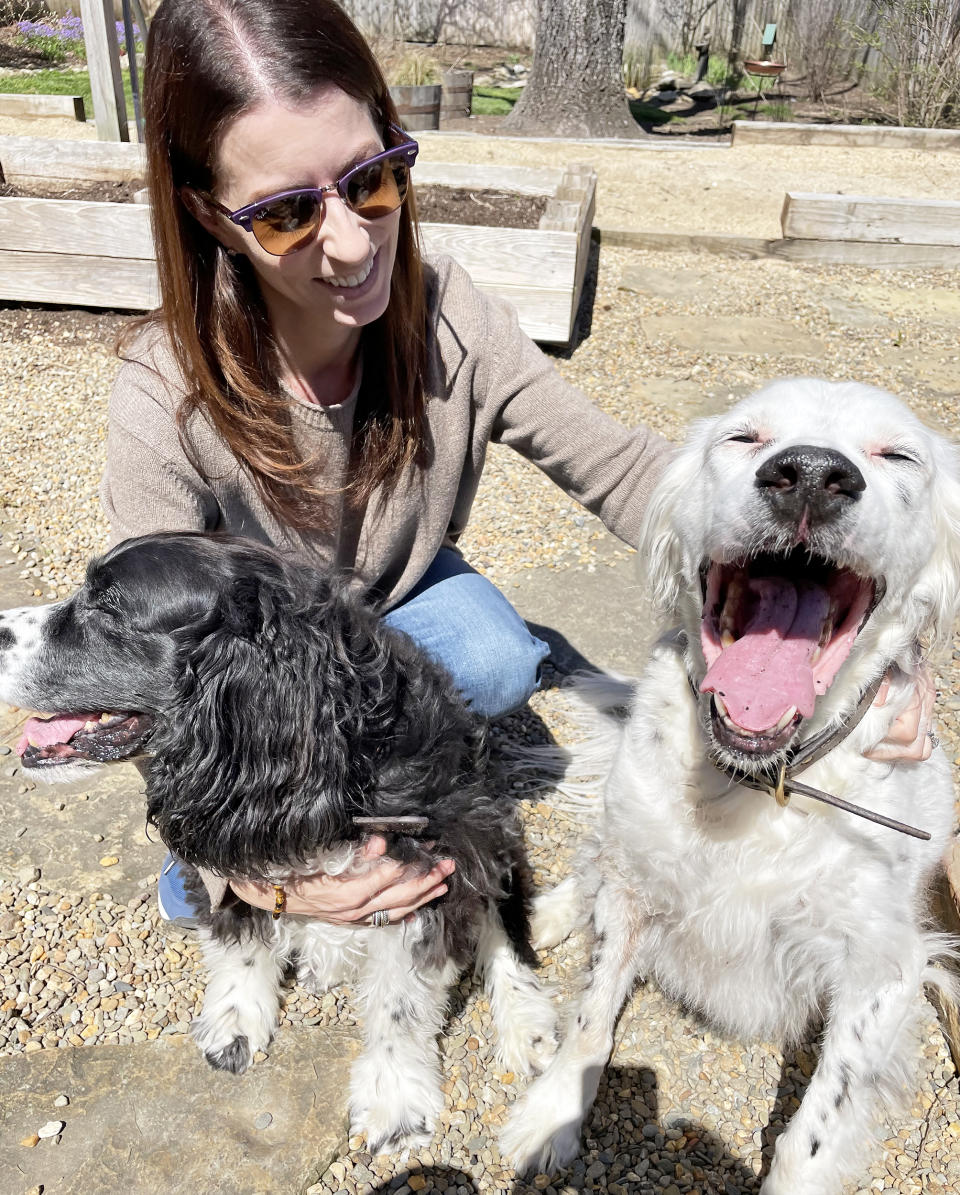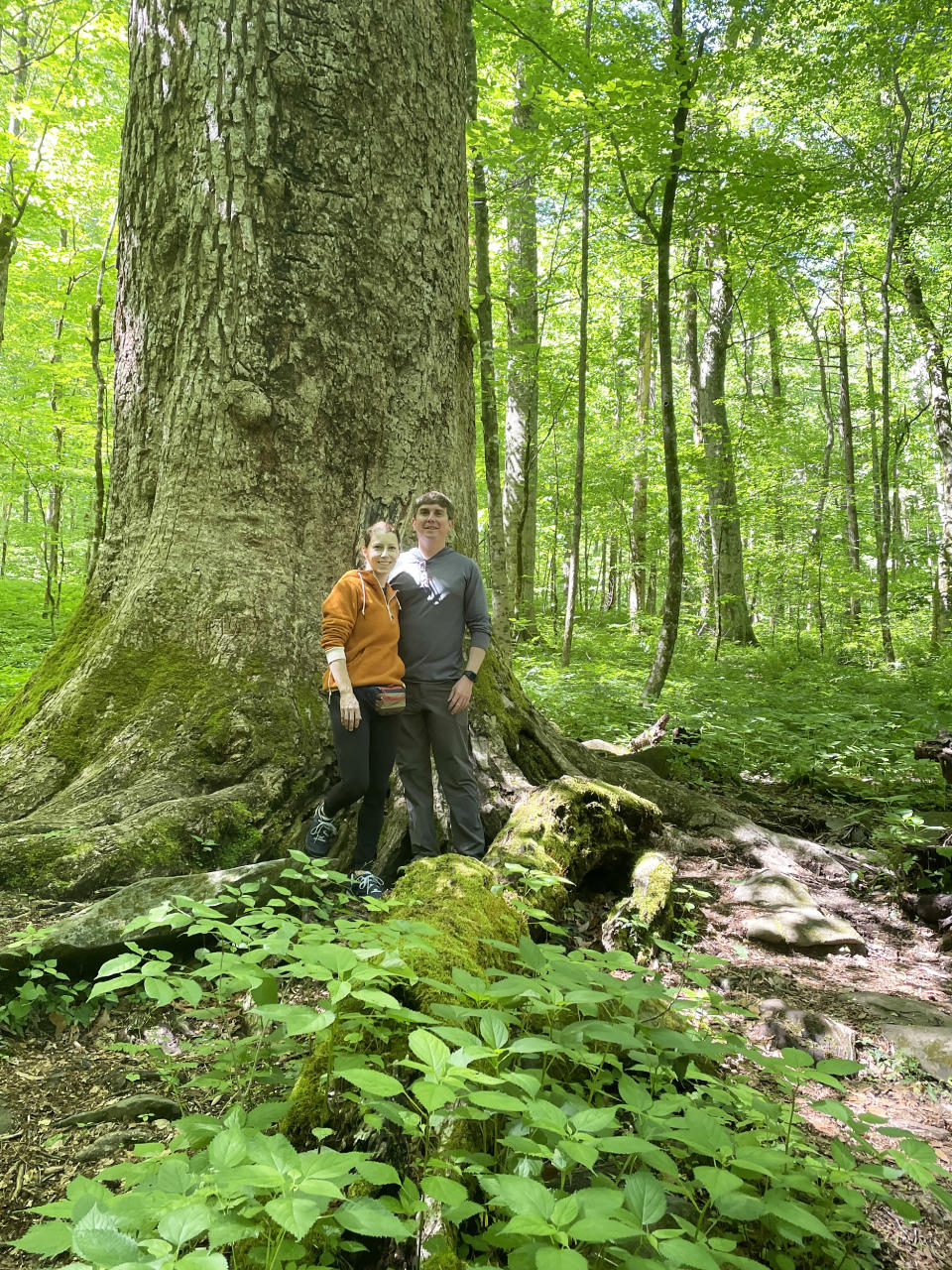Doctors thought her cough was COVID-19 pneumonia. It was lung cancer

Emily Walthall was a healthy 39-year-old woman enjoying life with her husband and their dogs when everything changed overnight.
The day after Thanksgiving 2021, she woke up with a weight on her chest.
“It was very abrupt. It was very uncomfortable,” Walthall, a lawyer who lives in Brevard, North Carolina, recalls to TODAY.com.
“I felt like I couldn’t get a full breath and within a couple of days, I started coughing… Within a couple of weeks, I was coughing to the point that I would sometimes gag.”
She never had a fever or a sore throat. But since Walthall would be visiting family for Christmas, she went to an urgent care a week before the holidays to get tested for COVID-19. The result was negative.

But the dry cough persisted so Walthall went to see her primary care doctor after Christmas. X-rays of her chest showed opacities throughout both lungs and a mass in the upper right lobe. A CT scan then confirmed “both of my lungs just looked like a mess,” she says.
Walthall was diagnosed with COVID-19 pneumonia, even though she never tested positive for the virus.
“I remember the primary care doctor saying to me, 'If you were ten years older and a smoker, we would have this mass in your upper right lobe biopsied right away. But you don’t have cancer, you have pneumonia,’” she recalls.
He was wrong.
'If you have lungs, you can get lung cancer'
When Walthall didn’t respond to a course of strong antibiotics, she had a follow-up CT scan in February 2022. Logging onto her online chart that night, she saw the results warning that the changes in her lungs “should be considered malignant,” she recalls.
More scans plus a biopsy revealed the true diagnosis: stage 4 non-small cell lung cancer that had spread to her spine and brain.
Walthall and her husband were shocked and devastated.
“I certainly did not have any thought that it could be cancer. I thought only people who smoke get lung cancer, which I never had,” she says.
That belief persists when she tells others about her diagnosis: “Everyone assumes that I’m a smoker,” she notes.
About 15% of lung cancer patients have never smoked, says Dr. Jared Weiss, an oncologist at UNC Health in Chapel Hill, North Carolina, who is treating Walthall.
“If you have lungs, you can get lung cancer,” Weiss tells TODAY.com. “Nobody deserves lung cancer, whether they’ve smoked or not.”
A DNA mutation can cause lung cancer in non-smokers, according to the Centers for Disease Control and Prevention. It’s like an error in the cell’s instruction manual, leading the cell to forget how to do its job and instead make copies of itself, spread and grow, Weiss says. Some of these mutations can be just bad luck, he adds.
The tissue taken from Walthall’s lungs during her biopsy underwent next generation sequencing to discover whether she had such a mutation.
It turned out Walthall had an RET gene rearrangement, which appears in about 1% to 2% of lung cancer patients, according to the American Lung Association. This leads to the production of abnormal RET proteins, which drive the growth of cancer cells, the National Cancer Institute explains.
It meant Walthall would benefit from targeted therapy known as selpercatinib or Retevmo, which blocks the activity of these proteins. She recalls Weiss telling her, “You have RET. We have a great medicine for this. I’m so happy for you.”
Weiss says he was pleased because the targeted therapy is the most active against the cancer while also the least toxic treatment possible.

Walthall takes three pills in the morning and at night with limited side effects such as dry mouth. Before she started taking the drug in March 2022, she had labored breathing and couldn’t walk upstairs because of the cancer.
Five days after she received the first dose, she stopped coughing. At three months, scans showed there was significant tumor reduction and no evidence of cancer in her brain. The lesions on her spine have been healing and she has remained stable since.

“You would have no idea if I didn’t tell you that I have a serious disease,” Walthall says. “Today, physically, my energy is as it was before. I exercise like I did before. The biggest challenge is emotional and psychological — just living with a serious disease for which there is not a cure."
The targeted therapy may eventually stop working as the cancer learns to evade it. But that may take years and if the cancer is progressing slowly, it may not pose a threat to a patient’s well-being, Weiss says. Radiation can target spots that are more threatening.
A next-generation RET inhibitor is being tested, so there’s already a plan B even before considering the option of chemotherapy, he adds.
Preventing lung cancer
Cigarette smoking is the No. 1 cause of lung cancer, according to the CDC, so if you smoke, it’s important to stop, Weiss says. Talk to your primary care doctor about lung cancer screening with an annual low dose CT scan. It’s recommended for current and former smokers 50 and older.
Radon, a naturally occurring invisible odor-free gas, is the second leading cause of lung cancer, the CDC notes. Weiss urged people to test their homes for the presence of radon with inexpensive kits.
Indoor cooking fumes are also a risk for lung cancer, but less so in the U.S. where homes are built to have good ventilation, he notes.
But even if you’re doing everything right, lung cancer can still strike, as Walthall found out.
“If you have lungs, you’re breathing all the time, which means that you’re constantly breathing in things that can cause cancer — that’s unavoidable. Our planet is polluted, and even if it weren’t, even oxygen can cause a mutation or two,” Weiss says.
Watch for lung cancer symptoms such as coughing that gets worse or doesn’t go away; chest pain, shortness of breath, fatigue and unexplained weight loss.
This article was originally published on TODAY.com

